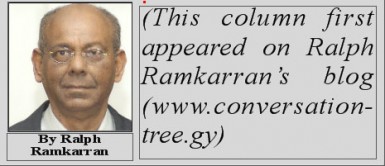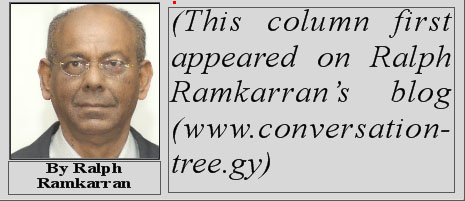By Ralph Ramkarran
By the time this article is published the Emancipation Day commemoration of the 175th Anniversary of the abolition of slavery would have passed. This year also marks the 250th anniversary of the 1763 Slave Uprising and the 190th anniversary of the 1823 Demerara Slave Rebellion. The 1763 and 1823 slave rebellions, along with economic factors, culminated eventually in the abolition of slavery in 1838, and are among the most cataclysmic events which have shaped the history and consciousness of the Guyanese people, in particular African Guyanese. This opportunity is taken to pay tribute to the heroes of these momentous struggles, to reflect on the example they left for us to follow and to thank the African Guyanese people and others who have kept alive their memory. Before it was fashionable, the old PPP began to recognize our heroes and named its party school after Accabre.
This must be a time for all Guyanese to reflect on the enduring passion which has always existed for human liberty and human dignity amidst the most degrading and terrifying brutality imaginable. 1763 and 1823 demonstrated this to us on a large scale. But our history is replete with individual and group acts of courage in the face of certain death such that we today cannot even begin to comprehend. Our ancestors fought for their own, not our survival, but we survived because they fought. African Guyanese are justly proud of the struggle of their ancestors for our freedom and for their achievements today although much more remains to be done.
Some legacies of slavery continue to haunt us. Lack of development and the persistence of racist ideology are but two. Africans have not always achieved the same economic, social and political status as other citizens in some countries including those as diverse as the United States and Brazil. In Guyana such claims continue to be made by African rights activists, notwithstanding the fact that we had in government for over a quarter of a century a political party which obtained the majority of its support from African Guyanese.

Cuffy would have seen that the only sure mechanism would have been a constitutional provision which recognizes that any government emerging from elections must have represented in it the major sectors of the Guyanese electorate in whatever manner of form they are politically represented. This debate took a national perspective in the latter half of the 1970s with proposals of the PPP and WPA for unity arrangements. Though unsuccessful in persuading the PNC, it remained on the political agenda and regained traction in 1999-2000 at the time of the constitution reform process. The reason it did not succeed at the latter time was the unwise opposition of the PNCR and of the PPP, then in office and recognizing its potential partisan advantages.
The reason for the latter, as was the reason for this specific constitutional construct of the Burnham constitution, was to ensure that what is now happening was possible, that is to say, a president and government holding office with minority support. This happens nowhere else except if the governing party is assured the support of enough opposition members to carry on the government, as in Australia, or elections are expected to be called at an opportune time by the government, as with the two previous minority governments of Canada.
A flawed constitutional arrangement, unlawfully imposed by an authoritarian ruler, and unwisely given democratic imprimatur by both major political parties, is stifling the democratic will of the people of Guyana and worse, is grievously affecting our development.
If Cuffy were alive today he would certainly have appreciated the political freedom which exists in Guyana and the world and the advances which have been made by the descendants of slaves. He would have been disappointed at the still entrenched racism and discrimination against people of colour and all other people for whatever reason. For Guyana he would be deeply disturbed at the political impasse created by the intransigence which our constitution has made possible. He would appeal to the historic record and the goodwill of the PPP, creating unity at is formation, offering a coalition in the 1960s, offering a patriotic front in the 1970s and negotiating unity with the PNC in the 1980s, all in support of a transformation of our political culture. He would never have relented on such a position.






